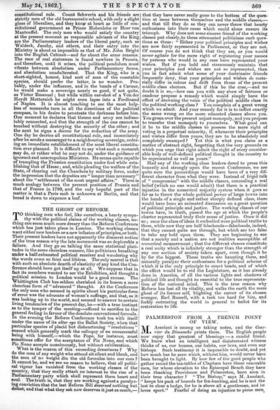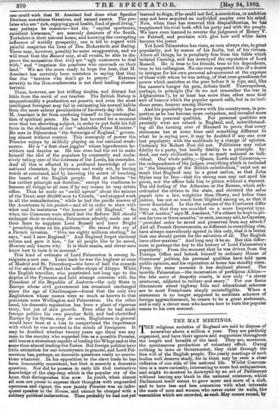PALMERSTON FROM A FRENCH. POINT OF VIEW.
111- Assolant is among us taking notes, and the aw- ing rier du Dimanche prints them. The English people now enjoy that greatest of blessings — a candid friend. We know what an intelligent and disinterested witness thinks of us, our houses, our habits, our laws, and even our bishops. Such testimony it is impossible to doubt, and yet how much has he seen which, without him, would never have been brought to light. By how few of the good people who gather round the tea-tables of Clapham have those venerable men, for whose elevation to the Episcopal Bench they have been thanking Providence and Palmerston, been seen in their true character ? "The Bishop," says M. Assolant, "keeps his pack of hounds for fox-hunting, and he is not the last to clear a hedge, for he is above all a gentleman, and he loves sport." Fearful of doing an injustice to pious men, one could wish that M. Assolant had done what Speaker Denison sometimes threatens, and named names. Thepre- lates who are " rich, enjoying good health, fond of good liivng," may perhaps be common—but the " capital sportsmen, excellent horsemen," are scarcely denizens of the South. Yorkshire is their natural home, and knowing the corrupting influence of worldly prosperity, one is led to regard with painful suspicion the lives of Drs. Bickersteth and Baring. There may, however, possibly be some exaggeration, and we will trust that the Record may, at all events, be able to dis- prove the accusation that they are "ugly customers to deal with," and "imprison the poachers who encroach on their land." We are the more ready to hope the best, that M. Assolant has certainly been mistaken in saying that they fine the "heretics who don't go to prayer." Extreme severity to the Non-conformists is not their leading charac- teristic.
These, however, are but trifling doubts, and detract but little from the merit of our teacher. The British Bishop is unquestionably a production sui generis, and even the most intelligent foreigner may fail in estimating his normal habits from the more salient peculiarities of his every-day life. But M. Assolant is far from confining himself to the contempla- tion of spiritual peers. He has but hovered for a moment over that too absorbing subject, in order to put forth his full force in the delineation of our "admirable Prime Minister." He sees in Palmerston "the Sovereign of England," govern- ing almost without control. This monopoly of power the Premier enjoys by skilfully playing on our national weak- nesses. He is "a first class juggler" whose legerdemain be- wilders and dazzles us. He has even had the art to make himself the idol of the populace by constantly and exclu- sively taking care of the interests of the Lords, his comrades.
And all this is effected by a profound knowledge of our national character, by cleverness and ready wit, by having words at command, and by knowing the secret of touching the hearts of the English people. But at bottom "he has neither principle nor doctrine," except the readiness to become all things to all men if by any means he may retain office. Thus be made an "awful uproar" about the seizure of the Trent, sent 30,000 men to Canada, "and stopped work in all the manufactories," while he had the pacific answer of the Americans in his pocket—and all in order to show with what zeal he maintains "the honour of old England." So when the Commons were afraid lest the Reform Bill should endanger their re-election, Palmerston adroitly made use of their fears to supplant Lord Russell and leave Bright "preaching alone on his platform." He raised the cry of a French invasion. "Give me eighty millions sterling," he says," and I save England." And England forgot electoral reform and gave it him, "for all people like to be saved, Heaven only knows why. It is their mania, and clever men know how to turn it to account."
This kind of estimate of Lord Palmerston is among fo- reigners a new one. Years back he was the bugbear at once of Madrid and St. Petersburg—the hero of half the canards of the salons of Paris and the coffee-shops of Aleppo. While the English traveller, who penetrated not long ago to the depths of the Pyrenees and held strange converse with the President of the Republic of Andorra—the only State in Europe whose civil government has remained unchanged since the age of Charlemagne—found that the only two Englishmen whose names were so much as known to that potentate were Wellington and Palmerston. On the other hand, his domestic reputation has been a plant of vigorous truly, but yet of slow growth. Even after he had made foreign politics his own peculiar field, and had electrified Europe by his Syrian coup de main, Englishmen in general would have been at a loss to comprehend the importance with which he was invested in the minds of foreigners. It may be doubted whether twenty years ago there was any man in the country who regarded him as a possible Premier, still less as a statesman capable of leading the Whigs and at the same time almost leading the Tories. But foreign politics have little attraction for our countrymen in general, and Lord Pal- merston has, perhaps, on domestic questions really no convic- tions whatever. In his opposition to the slave trade he has been honourably consistent, but that is scarcely a domestic question. Nor did he possess in early life that instinctive knowledge of the clap-trap which is the popular cry of the hour, that distinguishes him now. In youth, when almost all men are prone to express their thoughts with unguarded openness and vigour, the now jaunty Premier was an infre- quent speaker in the House, and cannot be charged with a solitary political indiscretion. Then probably he had not yet learned to feign, if he could not feel, a conviction, or ambition may not have acquired an undivided empire over his mind. Now, when time has removed this disqualification, he has 'supplanted his rival both with his party and with the people. We have even learned to reverse the judgment of Henry V. on Falstaff, and proclaim with glee how well white hairs become the jester. Yet Lord Palmerston has risen, as men always rise, to great popularity, not by reason of his faults, but of his virtues. Above all things, he is peculiarly free from the foible which isolated Canning, and has destroyed the reputation of Lord Russell. He is true to his friends, true to his dependents, true to his colleagues. No one ever suspected him of a desire to intrigue for his own personal advancement at the expense of those with whom be was acting, of that over-greediness for power which snatches at the pear before it is ripe, and, like the usurer's hunger for gain, defeats itself. Unscrupulous, perhaps, in principle (for do we not remember the war in Afghanistan ?), he at least has more than other men that sort of honour which the popular speech calls, but in no invi- dious sense, honour among thieves. And his popularity has grown with his countrymen, in pro- portion as he has become more outspoken, and revealed more clearly his personal qualities. For personal qualities are precisely what are valued in England, and, notwithstand- ing all the turning over of Hansard to prove that every statesman has at some time said something different to what he is saying now, it may be doubted if any one ever lost popularity with the multitude by a change of opinion. Certainly Sir Robert Peel did not. Politicians may value fidelity to a party, but hardly fidelity to a principle. In- deed, our very civilization is not so much national as indi- vidual. Our whole polity,—Queen, Lords and Commons,— the independence of the judges, everything which is included in "the blessings of the British constitution," exist not so much that England may be a great nation, as that John Styles may be free—that the strong man may not spoil his goods, nor the officer hale him to prison without a warrant. The old feeling of the Athenian or the Roman, which sub- ordinated the citizen to the state, and elevated the salus populi into a law, weightier than liberty, and holier than justice, has not so much been blighted among us, as that it never flourished. In this the nations of the Continent differ from us, that they are moulded on a more Imperial type. "What matter," says M. Assolant, "if a citizen be kept in pri- son for two or three months," or sent, one may add, to Cayenne, "provided order be saved and preserved from any attack ? And all French Governments, so different in everything else, have always marvellously agreed in this only, that it is better that one should perish for the salvation of all. The English have other maxims." And long may it be so. But this differ- ence is perhaps the key to the history of Lord Palmerston's popularity. From the moment that he was driven from the Foreign Office and betook himself to ordinary House of Commons' politics, -his personal qualities have told upon public opinion, and his reputation at home has steadily risen. From the same moment it has declined abroad. The terrible Palmerston—the incarnation of perfidious Albion— the bête noire of despotic courts, is now only "a clever aristocrat, addicted to raillery and saucy." For our fierce discussions about highway bills and educational schemes are to most Frenchmen simply unintelligible. When a statesman is no longer supposed to meditate schemes of foreign aggrandizement, he ceases to be a great statesman, and is only a clever man who knows how to turn the popular mania to his own account.































 Previous page
Previous page